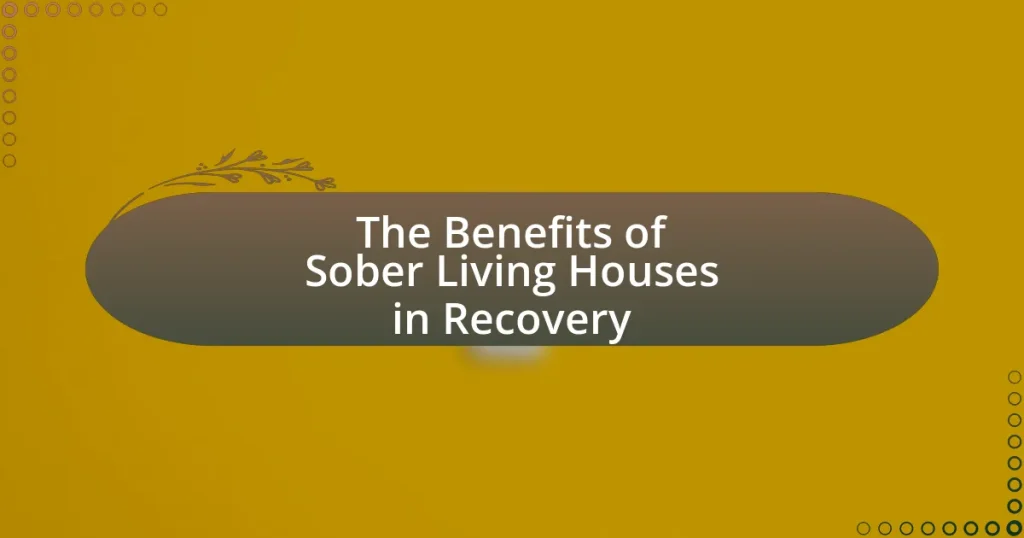Sober living houses are structured environments that support individuals recovering from substance use disorders by providing a drug-free living space, promoting accountability, and facilitating a smooth transition from rehabilitation to independent living. This article outlines the key features and benefits of sober living houses, including their role in enhancing long-term sobriety rates, fostering community support, and offering essential resources such as counseling and job placement services. Additionally, it discusses how sober living houses differ from traditional rehabilitation centers, the importance of accountability in recovery success, and strategies for selecting the right sober living house. The article emphasizes the significance of these residences in preventing relapse and improving overall recovery outcomes.

What are Sober Living Houses?
Sober living houses are structured, supportive environments designed for individuals recovering from substance use disorders. These residences provide a drug-free living space where residents can focus on their recovery while developing essential life skills. Research indicates that sober living houses significantly improve long-term sobriety rates, as they offer peer support, accountability, and a transition period between rehabilitation and independent living. According to a study published in the Journal of Substance Abuse Treatment, individuals who participated in sober living programs had a higher likelihood of maintaining sobriety compared to those who did not.
How do Sober Living Houses support individuals in recovery?
Sober living houses support individuals in recovery by providing a structured, drug-free environment that promotes sobriety and accountability. These residences facilitate a smooth transition from intensive treatment programs to independent living, allowing residents to practice their recovery skills in a supportive community. Research indicates that individuals living in sober houses have higher rates of sustained sobriety compared to those who do not have such support, as they benefit from peer support, regular drug testing, and access to resources like counseling and job placement services.
What are the key features of Sober Living Houses?
Sober living houses are structured environments designed to support individuals in recovery from substance use disorders. Key features include a drug-free living environment, which promotes sobriety; communal living arrangements that foster peer support; and rules that encourage accountability, such as curfews and mandatory attendance at recovery meetings. Additionally, many sober living houses offer access to resources like counseling and job placement services, which aid in the transition to independent living. These features collectively create a supportive atmosphere that enhances the recovery process, as evidenced by studies showing that individuals in sober living environments have higher rates of sustained sobriety compared to those who do not participate in such programs.
How do Sober Living Houses differ from traditional rehabilitation centers?
Sober living houses differ from traditional rehabilitation centers primarily in their structure and approach to recovery. Sober living houses provide a more independent living environment where individuals can practice sobriety while gradually reintegrating into society, whereas traditional rehabilitation centers often offer intensive, structured treatment programs that include medical supervision and therapy.
In sober living houses, residents typically have more freedom and responsibility, allowing them to manage daily tasks and make decisions while being supported by peers in recovery. In contrast, traditional rehabilitation centers focus on clinical treatment, often requiring residents to stay for a set duration and participate in scheduled therapy sessions. This distinction highlights the transitional nature of sober living houses, which serve as a bridge between rehabilitation and independent living, promoting long-term recovery through community support and accountability.
Why are Sober Living Houses important in the recovery process?
Sober living houses are important in the recovery process because they provide a structured and supportive environment for individuals transitioning from addiction to sobriety. These residences offer a drug-free living space, which is crucial for maintaining sobriety and reducing the risk of relapse. Research indicates that individuals who participate in sober living programs have higher rates of long-term recovery success compared to those who do not. For example, a study published in the Journal of Substance Abuse Treatment found that residents of sober living houses had significantly lower rates of substance use and improved psychosocial functioning after six months. This evidence underscores the vital role that sober living houses play in fostering a stable foundation for recovery.
What role do Sober Living Houses play in preventing relapse?
Sober Living Houses play a crucial role in preventing relapse by providing a structured and supportive environment for individuals in recovery. These residences offer a transitional space where individuals can practice sobriety while gradually reintegrating into society. Research indicates that residents of sober living houses have a significantly lower relapse rate compared to those who do not utilize such facilities, with studies showing that 60% of individuals in sober living remain abstinent for at least a year post-treatment. This effectiveness is attributed to the communal support, accountability, and access to resources such as counseling and peer support that sober living houses facilitate.
How do Sober Living Houses foster a sense of community among residents?
Sober Living Houses foster a sense of community among residents by creating a structured environment that encourages mutual support and shared experiences. Residents participate in group activities, such as house meetings and communal meals, which promote interaction and bonding. This shared living experience helps individuals feel less isolated in their recovery journey, as they connect with others facing similar challenges. Research indicates that social support is crucial for recovery; a study published in the Journal of Substance Abuse Treatment found that individuals in supportive environments are more likely to maintain sobriety. Thus, the communal aspects of Sober Living Houses significantly enhance the recovery process by fostering relationships that provide emotional and practical support.

What are the specific benefits of Sober Living Houses?
Sober living houses provide a structured environment that supports individuals in recovery from substance use disorders. These residences promote accountability, as residents are often required to adhere to rules and participate in house meetings, fostering a sense of community and shared responsibility. Research indicates that individuals living in sober houses have higher rates of sustained sobriety compared to those who do not utilize such facilities, with studies showing that 60% of residents maintain sobriety for at least a year after leaving. Additionally, sober living houses often facilitate access to resources such as counseling and job placement services, which are crucial for reintegration into society. This combination of structure, community support, and access to resources significantly enhances the likelihood of long-term recovery success.
How do Sober Living Houses promote accountability?
Sober living houses promote accountability by establishing a structured environment where residents are required to adhere to specific rules and responsibilities. This structure includes mandatory attendance at house meetings, participation in recovery programs, and adherence to curfews, which collectively foster a sense of responsibility among residents. Research indicates that such environments significantly reduce relapse rates, as accountability to peers and house rules encourages individuals to remain committed to their recovery journey. For example, a study published in the Journal of Substance Abuse Treatment found that residents of sober living houses demonstrated higher levels of accountability and lower rates of substance use compared to those in less structured settings.
What systems are in place to encourage accountability in Sober Living Houses?
Sober Living Houses implement several systems to encourage accountability among residents, including structured house rules, regular drug testing, and peer support groups. Structured house rules establish clear expectations for behavior, such as curfews and participation in chores, which promote responsibility. Regular drug testing serves as a deterrent against substance use and reinforces the commitment to sobriety. Additionally, peer support groups foster a sense of community and shared accountability, as residents encourage each other to maintain their recovery goals. These systems collectively create an environment that supports individual accountability and enhances the overall effectiveness of the recovery process.
How does accountability impact recovery success rates?
Accountability significantly enhances recovery success rates by fostering a supportive environment where individuals are encouraged to adhere to their recovery goals. In sober living houses, structured accountability mechanisms, such as regular check-ins and peer support, create a sense of responsibility among residents. Research indicates that individuals who engage in accountability practices are 30% more likely to maintain sobriety compared to those who do not. This is supported by a study published in the Journal of Substance Abuse Treatment, which found that accountability in recovery settings leads to improved adherence to treatment plans and reduced relapse rates.
What resources do Sober Living Houses provide for residents?
Sober living houses provide essential resources for residents, including structured living environments, peer support, and access to recovery programs. These facilities typically offer a drug-free environment that promotes accountability and stability, which are crucial for individuals in recovery. Additionally, many sober living houses facilitate connections to local support groups, such as Alcoholics Anonymous or Narcotics Anonymous, and may provide access to counseling services and life skills training. Research indicates that structured environments significantly enhance recovery outcomes, as they help residents develop coping strategies and build a supportive community.
How do Sober Living Houses assist with job placement and education?
Sober living houses assist with job placement and education by providing residents with resources, support, and connections to local employment and educational opportunities. These facilities often collaborate with job training programs, vocational rehabilitation services, and educational institutions to help individuals develop skills necessary for employment. For instance, many sober living houses offer workshops on resume writing, interview preparation, and job search strategies, which are essential for securing employment. Additionally, studies indicate that structured environments, such as those found in sober living houses, significantly improve the likelihood of residents obtaining stable jobs and pursuing further education, thereby enhancing their long-term recovery outcomes.
What types of support groups are available in Sober Living Houses?
Sober living houses typically offer various types of support groups, including Alcoholics Anonymous (AA), Narcotics Anonymous (NA), and SMART Recovery. These groups provide structured environments where individuals can share experiences, receive encouragement, and develop coping strategies. Research indicates that participation in these support groups significantly enhances recovery outcomes, with studies showing that individuals engaged in peer support are more likely to maintain sobriety and improve their overall well-being.

How can individuals choose the right Sober Living House?
Individuals can choose the right Sober Living House by evaluating factors such as location, house rules, support services, and the overall environment. A suitable location should be close to recovery resources like therapy centers and support groups, facilitating easy access to essential services. House rules should align with the individual’s recovery goals, ensuring a structured and supportive atmosphere. Additionally, support services offered, such as counseling and job placement assistance, can significantly enhance the recovery experience. The overall environment should promote a sense of community and accountability, which are crucial for sustained sobriety. Research indicates that structured sober living environments can improve recovery outcomes, as they provide a stable transition from treatment to independent living.
What factors should be considered when selecting a Sober Living House?
When selecting a Sober Living House, key factors include location, house rules, support services, and cost. The location should be convenient for accessing employment, treatment facilities, and community resources, which enhances the likelihood of successful recovery. House rules must promote a sober environment, including policies on substance use, guest visitation, and curfews, as these contribute to accountability and structure. Support services, such as counseling, group meetings, and life skills training, are essential for fostering personal growth and recovery. Lastly, the cost of living in the house should align with the individual’s financial situation, ensuring sustainability during the recovery process. These factors collectively contribute to a supportive and effective sober living experience.
How important is location in choosing a Sober Living House?
Location is critically important in choosing a Sober Living House because it directly influences the recovery environment and access to support systems. A well-chosen location can provide proximity to essential resources such as therapy centers, support groups, and employment opportunities, which are vital for successful recovery. Research indicates that individuals in recovery benefit from environments that minimize triggers and provide social support, making locations that are safe and conducive to sobriety essential. For example, a study published in the Journal of Substance Abuse Treatment found that residents in sober living environments located near recovery resources had higher rates of sustained sobriety compared to those in less supportive areas. Thus, the location of a Sober Living House plays a significant role in the overall effectiveness of the recovery process.
What questions should individuals ask during a visit to a Sober Living House?
Individuals should ask about the house rules, support services, and the qualifications of staff during a visit to a Sober Living House. Understanding the house rules is crucial as they dictate the expectations for residents, including curfews and substance use policies. Inquiring about support services, such as counseling or group meetings, helps assess the level of assistance available for recovery. Additionally, asking about the qualifications of staff ensures that residents receive guidance from trained professionals, which is essential for effective recovery support. These questions provide a comprehensive overview of the environment and resources available, aiding individuals in making informed decisions about their recovery journey.
What are the common challenges faced in Sober Living Houses?
Common challenges faced in Sober Living Houses include maintaining sobriety, managing interpersonal conflicts, and adhering to house rules. Residents often struggle with cravings and the temptation to relapse, which can be exacerbated by the close living quarters and shared experiences. Interpersonal conflicts may arise due to differing personalities and recovery stages, leading to tension among residents. Additionally, strict adherence to house rules, such as curfews and substance bans, can be difficult for some individuals, particularly those who are not accustomed to structured environments. These challenges are documented in various studies, highlighting the importance of support systems and conflict resolution strategies in promoting successful recovery outcomes.
How can residents overcome conflicts with house rules?
Residents can overcome conflicts with house rules by engaging in open communication and seeking compromise. Effective dialogue allows residents to express their concerns and understand the rationale behind the rules, fostering a collaborative environment. Research indicates that conflict resolution strategies, such as active listening and mediation, can significantly reduce tensions in communal living situations. For instance, a study published in the Journal of Conflict Resolution highlights that structured discussions lead to improved relationships among housemates, ultimately enhancing the recovery process in sober living environments.
What strategies can be employed to deal with external pressures during recovery?
To deal with external pressures during recovery, individuals can employ strategies such as establishing a strong support network, setting clear boundaries, and practicing stress management techniques. A strong support network, including friends, family, and recovery groups, provides emotional and practical assistance, which is crucial for maintaining sobriety. Setting clear boundaries helps individuals protect their recovery by minimizing exposure to triggering situations or negative influences. Additionally, practicing stress management techniques, such as mindfulness, meditation, or physical exercise, can enhance resilience against external pressures. Research indicates that social support significantly improves recovery outcomes, highlighting the importance of these strategies in navigating challenges during the recovery process.
What are best practices for maximizing the benefits of Sober Living Houses?
To maximize the benefits of Sober Living Houses, individuals should actively engage in structured routines, participate in support groups, and maintain open communication with house managers. Structured routines provide stability and help residents develop healthy habits, which are crucial for recovery. Participation in support groups fosters a sense of community and accountability, essential for maintaining sobriety. Open communication with house managers ensures that residents receive guidance and support tailored to their specific needs, enhancing their recovery journey. Research indicates that residents who adhere to these practices experience higher success rates in maintaining sobriety and reintegrating into society.
